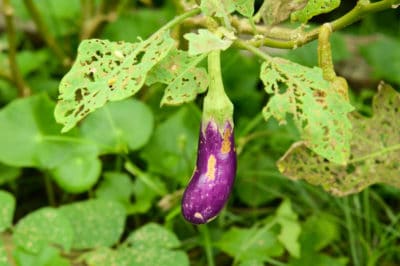Most Common Eggplant Pests
The following guide explains detailed information for eggplant gardeners about the most common pests that invade these plants.
- Flea beetles
- Shoot Borers
- Hornworms
- Aphids
- Cucumber beetles
- Earwigs
- Snails
- Slugs
- Whiteflies
- Thrips
- Armyworms
Methods for Controlling Eggplant Pests
These tips explain how you can control pests without the use of harsh chemical pesticides. Combining several preventative measures will give satisfactory results for pest control in your garden.
Crop Rotation
Rotating your crop each year prevents pests that overwinter in the soil, reducing insect populations. Also, plant your eggplant seedlings away from other crops that might spread pests. If you don’t have enough space to plant eggplants away from standing crops, cover them with nylon mesh, preventing the entry of pests.
Choose Resistant Varieties
Before buying eggplant seeds or seedlings, research the many varieties available that grow in your area. Choose varieties that are resistant to pests.
Remove Infected Foliage
If your eggplants show signs of pest infestation, remove the infected eggplant leaves and stems immediately. Avoid discarding them near your healthy eggplants, destroying them instead.
Use Pheromone Traps
Pheromones are chemicals produced by female insects to attract the males. Scientists have developed pheromones of most beetles and moths that eat crops. These pheromones are available for use in gardens to prevent pest populations. The synthetic pheromones are natural chemicals, produced by insects. They’re safe for humans, animals and the environment. You only need a tiny amount to trap the pests organically.
Try Trap Cropping
Just like people, insects have favorite foods. You can manage eggplant pests by planting trap crops along the perimeter of your garden. These plants protect your eggplants because the pests prefer to eat them instead. For example, Blue Hubbard squash and pumpkins attract cucumber beetles. Flea beetles and Colorado potato beetles prefer Italian and Japanese eggplant, so you can plant these varieties on the perimeter of your main crop.
Apply Mulch
Applying straw or plastic mulch around your seedlings and plants prevents whiteflies and moths from landing on the eggplant foliage.
Using these natural eggplant pest-control methods will help your eggplants grow into healthy, colorful fruits. When it comes time to harvest your eggplants, you’ll have a tender, flavorful crop.
